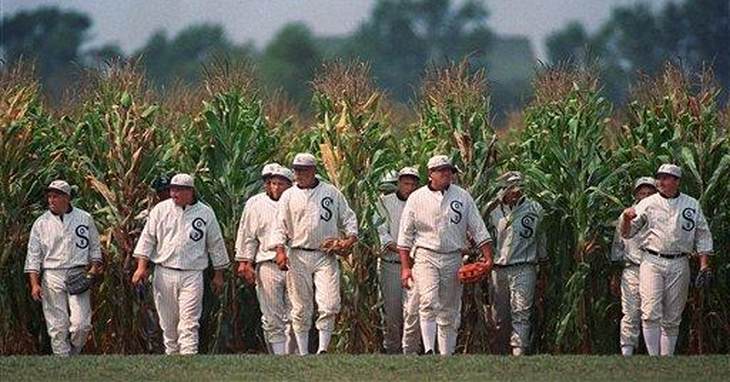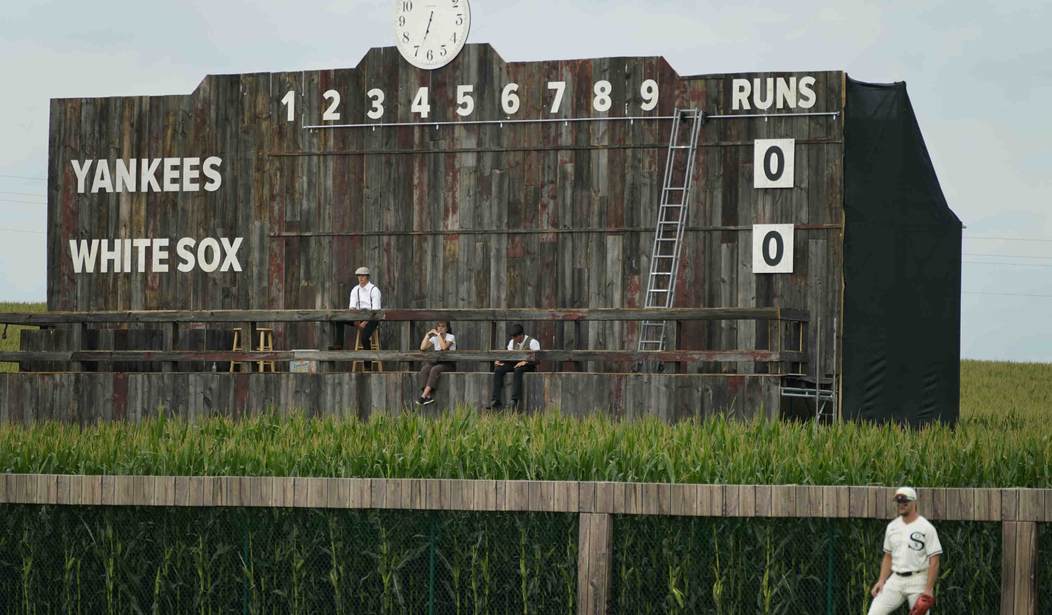Thursday night Major League Baseball hit it out of the park by staging the first-ever scheduled game in Iowa, playing at the landmark farm where the movie “Field Of Dreams” was filmed. The league built a new field to MLB dimensions (connected to the original field by a corn maze), but the outfield remained a cornfield and the setting was ethereal. All was rather magical for baseball fans, but for one journalist there was an implied dark side to the affair.
Chelsea Janes made her way to Dyersville for The Washington Post to report on the unique staging of a professional baseball contest and she strained mightily to find issues with the event. Too bad the ballplayers were not playing along. The search for problems begins early in the piece, as Janes described the wind blowing across the crops, and turned things instantly.
Whatever distractions that wind might have carried into the 8,000-seat temporary stadium at the site of the movie “Field of Dreams” seemed to dissipate in those fields, as if the corn itself was holding off the realities MLB wishes it could hold off forever. Thursday, after all, was supposed to be about the relentless magic of a timeless game.
Even while acknowledging there should have been every reason to be thrilled this writer was determined to find racial issues to inject into the proceedings. So where did she get this notion of problems? Mainly through her imagination.
For anyone unfamiliar, the movie this event was based upon the story of a farmer who starts hearing voices telling him to erect a baseball field in the middle of his corn crop. There are issues involving his deceased father, and then a reclusive novelist is involved, all centered around the mystical diamond. When the field was complete the 1919 Chicago White Sox team, lead by “Shoeless Joe” Jackson, shows up from out of the corn and they begin playing on a regular basis – but they’re only seen by select members of the family.

Here is where Janes latched onto things to find her conflict. You see, the film is centered on a team of nothing but white players, and this is because Major League Baseball was segregated at that time. This leads the writer to this passage:
“But beyond the corn and the sentiment, the evening stood also as an exhibition of contradiction, a reminder of the vast plains between the place MLB wants its sport to hold in the minds of its followers and the reality of its stewardship.”
The game seemed to be scripted, a multi-home run affair that saw the New York Yankees send a couple of homers into the corn in the 9th inning to tie the game before the White Sox won from a Tim Anderson walk-off home run. Anderson was of particular focus for Janes, considering that not only is he a black player, but he is a board member of The Player’s Alliance, an activist group composed of POC players. Surely he would be one to see all of the problematics from the film and the tie-in issues with this game.
That did not work out for Janes, given:
“[Anderson] has never seen the movie, which centers on White baseball legends at a time when Black players were not allowed to play alongside them.”
She then moved on to some of the other players, such as Cuban natives Jose Abreu and Yoan Moncada, but they too failed to deliver any quotable invective, focusing instead on the activities and cheering on every time a homer was launched into the crops. “Desperate to find an edge that would carve into her point, Janes wrote:
The game may not have had the same significance for everyone who played in it. But it seemed to mean something to everyone.
Yes, the game means something to everyone, as captured by a monologue delivered by James Earl Jones near the end of the movie:
Ray. People will come, Ray. They’ll come to Iowa for reasons they can’t even fathom. They’ll turn into your driveway, not knowing for sure why they’re doing it. They’ll arrive at your door, as innocent as children, longing for the past. “Of course, we won’t mind if you look around,” you’ll say, “It’s only twenty dollars per person.” And they’ll pass over the money without even thinking about it, for it is money they have and peace they lack. And they’ll walk off to the bleachers and sit in their shirt sleeves on a perfect afternoon. And find they have reserved seats somewhere along the baselines where they sat when they were children. And cheer their heroes.
And they’ll watch the game, and it’ll be as they’d dipped themselves in magic waters. The memories will be so thick, they’ll have to brush them away from their faces. People will come, Ray. The one constant through all the years Ray, has been baseball. America has rolled by like an army of steamrollers. It’s been erased like a blackboard, rebuilt, and erased again. But baseball has marked the time. This field, this game, is a part of our past, Ray. It reminds us of all that once was good, and that could be again. Oh, people will come, Ray. People will most definitely come.
This is the behavior of a writer arriving with a preset agenda and doing all she could to find evidence of her assured point. It is especially notable that when no evidence was found to back up her contention she did not let it go. Making it all the more ridiculous is that the supposedly racist film has as one of its main characters a black writer, played by James Earl Jones. That White Sox team was selected not based on race but the historical events that saw the players banned from the game, and this was a plot point in the film; bringing them back to be able to play once again.
The failed link alone is mirthful, but the implication that baseball is harboring a racial problem is also off-target. The MLB has one of the most diverse rosters in sports across all of its teams, probably second only to the NHL. Roughly 250 players from around 20 countries play in the big leagues. To look at the sport as a white man’s game is a conclusion you do not arrive at but one you show up with.
This is what happens when a journalist declares there just has to be a problem. A lack of evidence to support the claim does little to impede the reporting, while missing the much larger point.














Join the conversation as a VIP Member